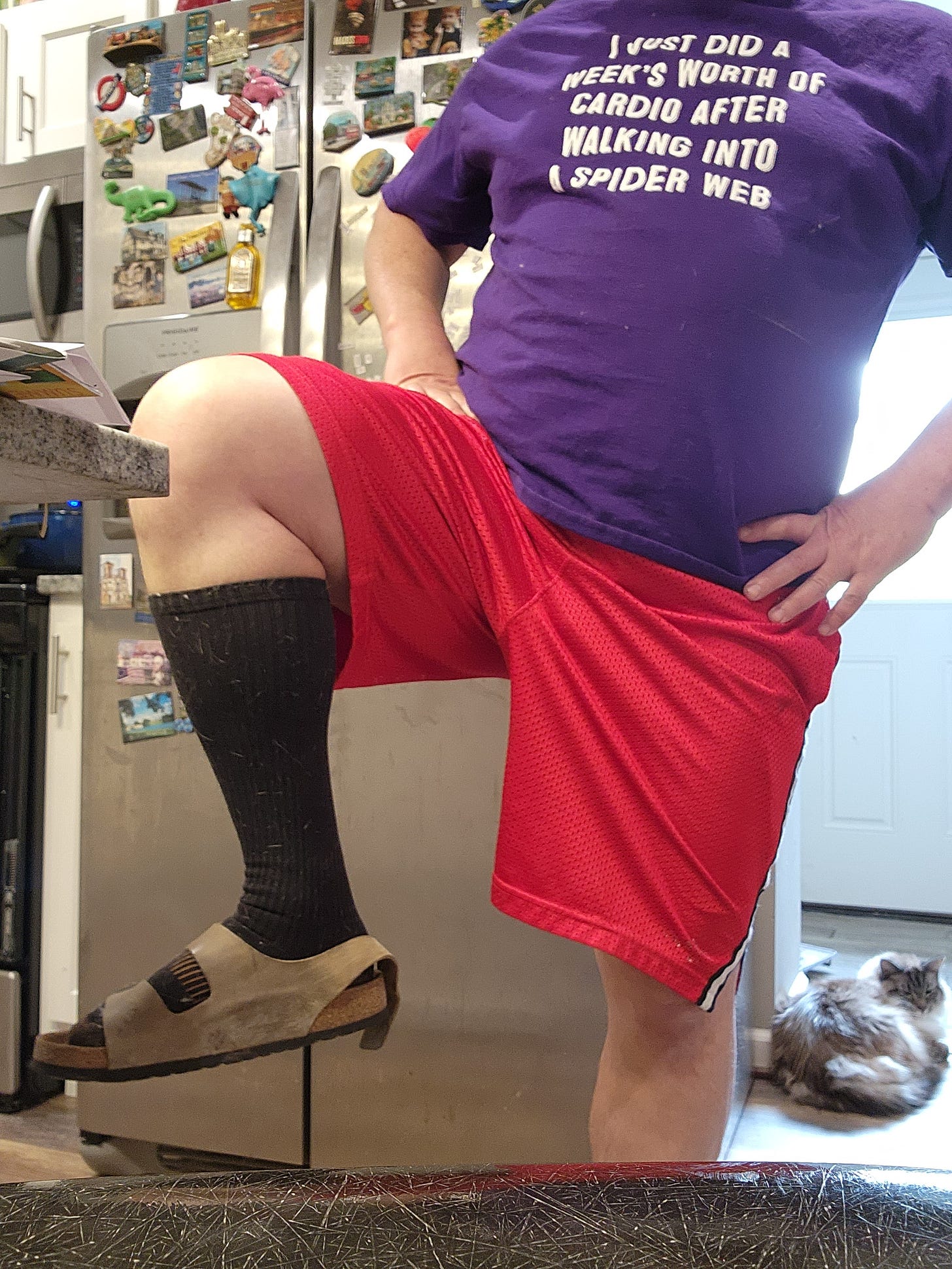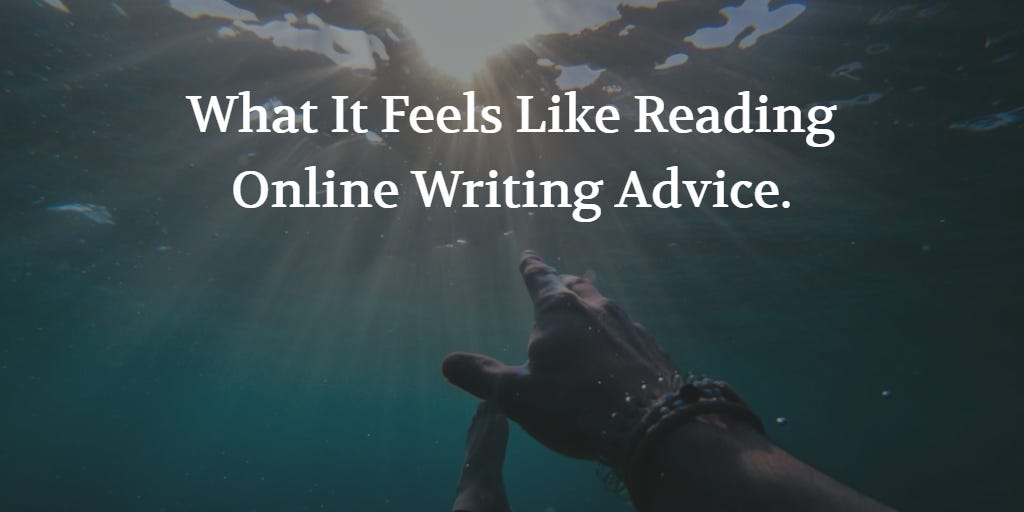Drowning in an Ocean of Writing Advice
The hustlebros' writing advice can be mind-numbing. Don't lose yourself trying to do everything. A mini-rant and a bit of useful writing advice to close.
Hook this. Story that. Bullet this other thing. E-effing-gads.
I’d hate to be someone new to writing online and trying to figure out where to start; the hustlebros (and sisters) are out for your attention (and credit card).
The best place to start is here: be yourself.
It’s not that using hooks and stories are bad. Just the opposite, humans are hard-wired to learn from story and we all want to craft that perfect opening line (and email subject lines and titles for you content) to “hook ‘em in.”
I am NOT saying that advice is bad. Writing is a craft. When you’re just starting, you need to learn that craft – and that NEVER stops. I’m currently working to hone my copywriting skills. I’ve written CTAs and email campaigns that performed well. I should be better. And will be.
I skim (sometimes even read!) at least one or two posts about writing and/or marketing tips daily (often more).
But there’s something about this constant stream of advice – much of it overlapping variations of the same thing – that feels dull and boring and fake even as is preaches finding your authentic voice.
There are formulas and formats that work – use short paragraphs, everyone loves a list, and cat videos still do quite well!
And if you’re new to writing or new to writing online, you should look around to see what works and emulate it to get yourself started.
But.

Be Yourself
Let me put this caveat here: “being yourself” doesn’t mean writing ONLY FOR YOURSELF!!!!!!
I’m assuming anyone reading this needs to use words to make money directly (if you’re a freelance writer) or use words to move a person to an action (content marketers) to eventually make money.
If you’re writing just to write and don’t care about results – have fun. No, seriously, that isn’t snarky – enjoy playing with words (I do a stream of consciousness prompt every Saturday just for myself).
However, if you are trying to make money by putting words out, you are writing for other people.
Never forget who you’re writing for.
Or you can go broke.
Your choice.
OK, moving off of the soapbox and back to the deluge of online writing advice.
It’s just that . . . and it’s hard to put my finger on it . . . someone new to writing can get lost in this forest of advice. Or just keep running face-first into tree after tree of advice to follow and forget to follow a basic rule of writing: be yourself.
Routine Advice and You
You don’t need to wake up at 5 a.m., meditate for 15 minutes, journal, take your morning beverage of choice into your dedicated writing space, and then begin your day.
Those are all good things to do – if they work for you.
You need “some” structure to write. How much structure? Dunno, you’ve gotta figure that out for yourself.
I work best when I write notes – in a notebook or on 3x5 index cards – and block time to write using those notes. Sometimes that time is in the morning; sometimes afternoon; sometimes at night.
Someone else might prefer a regular time or take notes only on their laptop or only use a purple glitter pen and pink paper.
We’re all individuals.
There is a solid chunk of writing advice that works for nearly everyone, especially when starting out (ugly first draft, blocking time, regular writing spot).
There’s good advice for what’s working online at any given time.
But sometimes what works for everyone else, or at least most everyone, won’t work for you.
No one can tell you what’s going to work for you for writing (or content marketing for that matter). There are certain rules of the road that are helpful and that will keep you from driving into a ditch. Other than that though . . . one hand on the wheel, one finger, two hands, driving with the occasional knee, upright, slouched, over/under/at the speed limit . . . we all have a driving style.
A Few Useful Pieces of Writing Advice
I’ve been doing this – writing/publishing/marketing – for 30 years now. By way of background, my first column responsibility (as an editorial intern for a print magazine) was sorting through 5 or 6 bins of mail (I REALLY appreciate automated letter openers even now!) from ECM industry vendors for new/updated products and other industry news (I’ve also sent a newsletter via fax – olde skool, baby!).
I think at least these three things about writing online are true today and will be true 300 years from now:
Be yourself.
Be useful. (And “useful” includes being entertaining – few things more useful than the ability to make people laugh.)
Writing isn’t enough, you need to also understand distribution. Learn the fundamentals of SEO because unless you don’t care that anyone reads your work (a lie for any writer), you need to understand how content is found online. I suspect in 300 years it’ll be called something other than SEO, but I won’t care by then!
As for writing advice itself, here are a few essentials to get you started:
WRITE. There’s no shortcut to improving. If you write regularly, you will get better. If you don’t, you won’t.
There are plenty of books that spend 30,000 words saying that. One of the best is Stephen King’s On Writing (and can’t recommend it enough if you’re a fan).
Understand the value of story. We are hardwired to pay attention to stories.
In a business context, I love Donald Miller’s Storybrand because his approach sits at the intersection of story and marketing.
Understand grammar. Note that I didn’t say master. I have been an editor – my understanding of the finer details of grammar are . . . not great. If you get the basics of punctuation mostly right and don’t misspell anything, that’s often good enough.
The Elements of Style remains in print for a reason. Get a copy.
I’ve use the Chicago Style Guide – mostly because they are in favor of the Oxford Comma. It’s not essential, but at least be aware that different style guides exist. The variations are minimal, but can trip you up – especially as a freelance writer.
Write. Did I mention you need to write?
I'll wrap up with the best advice about advice I know:
Learn how to ignore advice that doesn’t work for you.
Or you can skip writing yourself and hire me. Let’s talk: duhonius@gmail.com and 301275-7496.



Always good advice, Bryant